#On The Set Of Prisoners In Georgia(2013)
Text




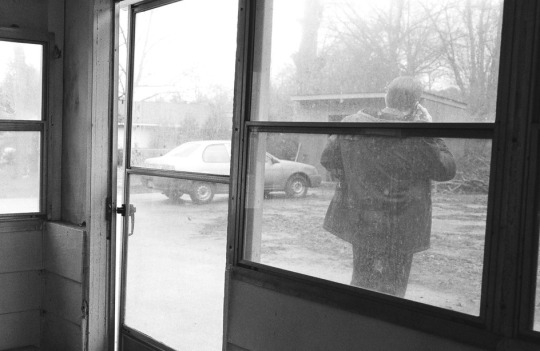
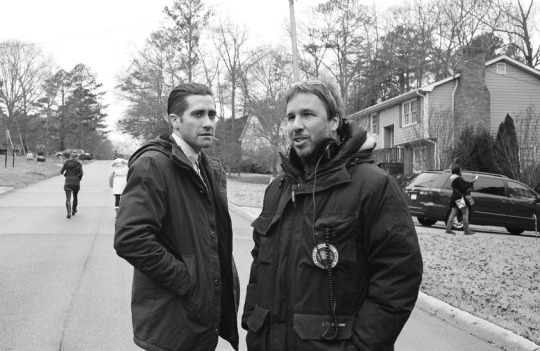
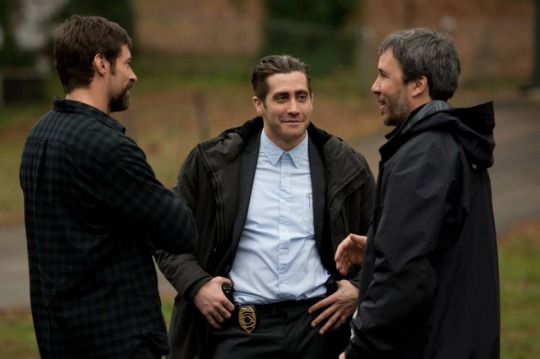

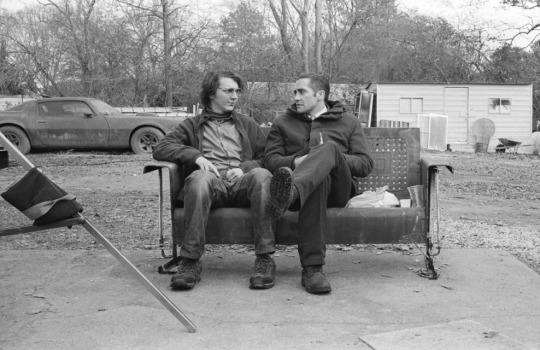
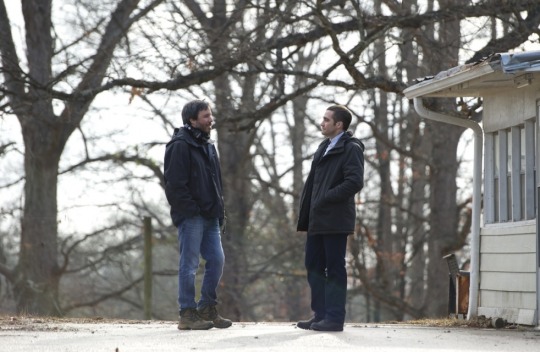
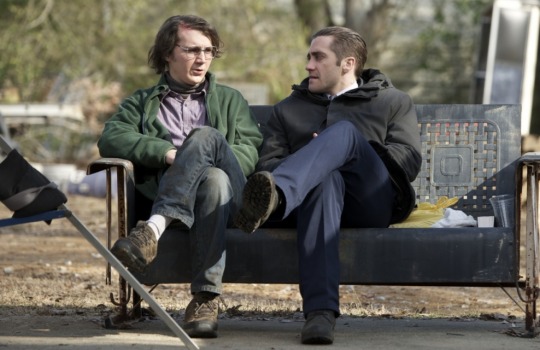
On The Set Of Prisoners In Georgia(2013) pics....
#On The Set Of Prisoners In Georgia(2013)#dennis villeneuve#paul dano#hugh jackman#jacob benjamin gyllenhaal#jake gyllenhaal#jacob gyllenhaal#donald mowat#makeup#makeup artist
39 notes
·
View notes
Text
When Anastasiya Burakova fled Russia a year ago, she sought refuge in the Ukrainian capital, Kyiv. Burakova, a Russian lawyer, had been running an organization that gave legal assistance to people facing political prosecution in Russia. After the authorities in Moscow blocked her group’s website, Burakova realized that she herself could become a target of government persecution and moved to Kyiv. Three months later, she was on the run again when Russian President Vladimir Putin launched a full-scale attack on Ukraine. Like many Russian activists, she found a new home in the former Soviet republic of Georgia.
In the early days of the invasion, Burakova was flooded with requests for emigration advice from political activists and journalists in Russia who feared the Kremlin might close the borders and round up critics of the war. The number of flights out of Russia was shrinking as a result of Western sanctions, fueling a sense of panic among opposition-minded Russians. Within weeks of the attack, Burakova founded an organization called Kovcheg, Russian for “ark,” to help those who managed to escape Putin’s Russia. Kovcheg has since grown into an online clearinghouse offering everything from housing and legal advice to psychological counseling, language courses, and job placement.
“We try to help people integrate into the societies where they live because it’s a dead end to live outside of it,” Burakova said. “We try to get them to do what they can from abroad to stop the war and speed up the collapse of the Putin regime. We hope they’ll go back and become the backbone of a democratic Russia.”
The exodus out of Russia came in two waves: The first, in the immediate aftermath of the February invasion, was more politicized and included many opposition supporters; the second, following the Kremlin’s announcement of a partial mobilization in September, was less political, consisting primarily of young men unwilling to fight in Putin’s war. Hundreds of thousands of Russians have emigrated this year, scattering for the most part across Europe, Turkey, and Central Asia. Places such as Armenia and Kazakhstan, former Soviet republics that most Russians used to view as backwaters, suddenly became safe havens.
The new Russian emigration pales in scale to the refugee crisis that the invasion set off in Ukraine, where the United Nations estimates that more than 14 million people, or one-third of the country’s population, have been forced from their homes. But the wave of Russian exiles is significant because it includes some of Russia’s best minds and most politically active regime opponents.
The influence that political émigrés will have on the course of events in Russia remains to be seen. Putin prefers to have his opponents outside the country, where they are likely to lose contact with life back home and see their political credibility decrease as the Kremlin brands them as foreign stooges. In a March tirade, Putin disparaged those who left as “scum and traitors” Russia will spit out like flies in an act of “self-cleansing.”
A number of prominent Russian opposition politicians have refused to go into exile and now all find themselves behind bars: Alexey Navalny, who flew back to Moscow in 2021 after recovering abroad from an assassination attempt with a rare nerve agent; Vladimir Kara-Murza, who returned to Russia from the United States following the start of the invasion; and Ilya Yashin, a fixture in Russian opposition politics who vowed to remain in Moscow.
Mikhail Khodorkovsky, Russia’s most well-known exile, has said that he spends 10 hours a day keeping track of what is happening inside the country from his home in London. An oligarch who ran afoul of the Kremlin during Putin’s first term in office, Khodorkovsky served 10 years in prison before being pardoned and released in 2013 into exile. In recent years, Khodorkovsky supported various media and civil society projects inside Russia before the government shut them down and prosecuted their leaders. After the invasion of Ukraine, Khodorkovsky co-founded the Russian Anti-War Committee, a group of exiled opposition leaders, and helped fund Burakova’s Kovcheg aid organization.
In a new book that has been published online in English, Khodorkovsky lays out his vision for the future, arguing that to avoid a repetition of Putin’s one-man rule and break Russia’s cycle of authoritarianism, the country will need to adopt a parliamentary model and devolve power to its regions. To get there, Khodorkovsky writes, Russians driven into emigration should form a “second front” to help bring down the regime.
“The new political emigrants are giving voice to the opposition because people inside Russia, if they risk speaking up, face serious repressions,” Khodorkovsky told Foreign Policy. He pointed out that independent Russian media, as well as popular YouTube channels run by Putin critics like himself, all work from abroad now. “A significant portion of these people will return. What their influence will be is another question,” he said.
Recent Russian history is full of examples of political emigrants, many dying in exile, a few returning home triumphantly. Vladimir Lenin was undoubtedly the most successful, sneaking back into Russia after the last tsar abdicated and leading the 1917 Bolshevik Revolution. The ensuing civil war created the first big wave of political emigration from Russia, with as many as 3 million people fleeing the new Soviet authorities.
Still, the current exodus is unprecedented in recent times, said Mikhail Denisenko, director of the Vishnevsky Institute of Demography in Moscow. “We’ve never had such a big annual outflow, not even in the 1990s,” he said, when 2 million people left Russia in the chaos following the fall of communism. Because much of the data on emigration is incomplete or unreliable, and it is difficult to distinguish visitors from emigrants in border statistics, Denisenko’s “cautious estimate” is that 500,000 Russians have left the country this year and not come back.
The case of political scientist Ekaterina Schulmann is illustrative of that ambiguity. When she left Russia after the invasion to take a one-year fellowship at the Robert Bosch Academy in Berlin, Schulmann said she did not consider herself to be a political emigrant. But the Russian authorities have since designated her a “foreign agent,” a status that makes it practically impossible for her to continue her academic work in Russia. From her perch in Berlin, Schulmann has continued giving lively, erudite commentary on Russian politics and now has more than 1 million YouTube subscribers, most of them inside Russia.
Historically, Russian emigrants have been reluctant to form exile communities and have tried to assimilate, Schulmann told Foreign Policy. Large nations typically do not form diasporas, she said, and Russians abroad have been a disparate group lacking common symbols or traditions to rally around. What distinguishes the new Russian émigrés is that they are more homogeneous.
“Many people left in a short period of time. Socially they are very alike, and they left for very similar reasons. We see social structures emerging, but not political ones. Nobody has the political legitimacy,” Schulmann said. “A unifying force could have been Alexey Navalny, were he not in jail.”
Sergey Lagodinsky, a member of the European Parliament for the German Greens party, has known Navalny for more than a decade. “He just couldn’t imagine his work—his active political life—outside of Russia. That’s why he went back,” Lagodinsky said. What Navalny did not expect was that the Kremlin would wipe out his political organization in Russia, Lagodinsky said, effectively making any dissent a criminal offense.
Lagodinsky’s own family left Russia in 1993, when Germany was taking in Jewish immigrants from the former Soviet Union. He is now leading an effort to help Russian political emigrants obtain humanitarian visas throughout the European Union.
Russia’s democratic opposition has rarely spoken in one voice, with Navalny, Khodorkovsky, and others representing rival centers of gravity. Because of this diversity of opinion, Lagodinsky said, Russian émigrés do not need a political organization as much as a network that would help them speak to Western leaders. One idea, still unrealized, is for the Kremlin’s opponents abroad to establish an office in Brussels or Berlin.
Whatever splits exist in the opposition, Lagodinsky said their main problem is that the Kremlin has completely isolated Russia’s public space, making it impossible for Russian civil society to effect change inside the country. Therefore, the focus of Russian emigrants in Europe should be to prepare for the time after Putin, he said.
“It will be important—and challenging—to present a viable democratic alternative to a much worse alternative when things will be changing. We do need to take seriously an antidemocratic, worse-than-Putin alternative,” Lagodinsky said. “You need faces—strong leaders and politicians who offer themselves as alternatives.”
One such face may be Lyubov Sobol, a Navalny ally who became a protest leader three years ago after being barred from running for Moscow’s city council. She fled Russia last year when it no longer became possible for her to continue her opposition activism amid increasing pressure from the authorities. “After Navalny’s arrest and until my departure, not a single day went by that Russian law enforcement didn’t contact me, search my home, interrogate, or detain me,” Sobol said. She is aware of five criminal cases against her in Russia.
Long before he was imprisoned, Navalny mastered the use of social media to bypass state-run television and speak directly to supporters, and even now his exiled team keeps his Twitter and Instagram accounts active. Sobol said her job was to turn Navalny Live, a YouTube channel with 3 million subscribers, into the main opposition platform. “Our two goals are to reduce Putin’s legitimacy and increase trust in our democratic movement,” she said.
The political situation in Russia is currently marked by instability, said Schulmann, who foresees a free-for-all once there is a change in regime. “There will be a lot of political turmoil after Putin. Anyone will be able to take part,” she said. “But having the resources of a well-known name, media outlets, and followers is useful.”
Khodorkovsky, who was first jailed in 2003 and is now 59, said his potential role in a future government is diminishing the longer Putin hangs on to power. Khodorkovsky is resigned to the possibility that the Putin regime will endure for at least another three years. He cast doubt on whether he would be physically capable of taking on a leadership role because governing Russia, whose institutions Putin has completely gutted, will be a 24/7 undertaking.
Reforming Russia may very well be the task of a new generation. “We aren’t waiting for the fall of the regime,” said Sobol, who is 35. “We’re actively working toward it and want to get there as fast as possible.”
4 notes
·
View notes
Photo




My Legal Battle with my Family and their Co-horts / Co-conspirators (121):
There are four (4) image attached to this post:
The first (1st) image attached to this post is question #5 from the 3rd set of Interrogatories I sent my parents and my mother, Gloria Sumter’s, sworn answer on October 11th, 2016 that she did in fact correspond with felon Kenneth Smith. I previously mentioned that my mother, Gloria Sumter, corresponded with felon Kenneth Smith the entire time he was in prison between from 2008 and 2013. However, she attempts to portray that it was somehow at my instigation. As though I could make her write an armed robber and continue writing him after he physically assaulted me twice in prison, breaking my nose both times. She also attempts to insinuate that she only corresponded with him one time but this just isn’t true, she communicated / corresponded with Kenny Smith the ENTIRE time he was incarcerate between 2008 and 2013. And, even after he was released from prison.
The next image, which is the second (2nd) image attached to this post, is question #3 from the 3rd set of Interrogatories I sent my parents and my mother, Gloria Sumter’s, sworn answer on October 11th, 2016 admitting that she also communicated with Kenneth Smith during the year of 2013. She however attempts to portray that it was only one time and only because he had sent her a letter asking her to forward another letter that was enclosed to me. Well, first of all, if I wanted Kenneth Smith to have my address at Atlantic Station, I would have given it to him. But I didn’t because this man had already physically assaulted me in prison, breaking my nose both times. My mother also knew this, so why the hell would she forward me a letter from him anyway? Additionally, you should know that every outgoing piece of mail from any state prison in the state of Georgia is stamped with a big red stamp on the back instructing the party receiving the mail that if the enclosed letter in anyway asks the receiving party to forward it to a 3rd party, to not forward it and to return it to the institution from where it was sent.
The next image, which is the third (3rd) image attached to this post, is question #4 from the 3rd set of Interrogatories I sent my parents and my mother, Gloria Sumter’s, sworn answer on October 11th, 2016 admitting that she had knowledge of at least one of the times that Kenneth Smith had physically assaulted me in prison. She states that she knew of the second time which was in 2011. However this is not accurate as she DID in fact know of both times as I told my parents over the phone from prison.
The last image is the signature page from the 3rd set of Interrogatories evidencing that my parents took an oath and signed the Interrogatories on October 11th, 2016 when answering them.
1 note
·
View note
Text
Events 2.21 (after 1920)
1921 – Constituent Assembly of the Democratic Republic of Georgia adopts the country's first constitution.
1921 – Rezā Shāh takes control of Tehran during a successful coup.
1925 – The New Yorker publishes its first issue.
1929 – In the first battle of the Warlord Rebellion in northeastern Shandong against the Nationalist government of China, a 24,000-strong rebel force led by Zhang Zongchang was defeated at Zhifu by 7,000 NRA troops.
1937 – The League of Nations bans foreign national "volunteers" in the Spanish Civil War.
1945 – World War II: During the Battle of Iwo Jima, Japanese kamikaze planes sink the escort carrier USS Bismarck Sea and damage the USS Saratoga.
1945 – World War II: the Brazilian Expeditionary Force defeat the German forces in the Battle of Monte Castello on the Italian front.
1947 – In New York City, Edwin Land demonstrates the first "instant camera", the Polaroid Land Camera, to a meeting of the Optical Society of America.
1948 – NASCAR is incorporated.
1952 – The British government, under Winston Churchill, abolishes identity cards in the UK to "set the people free".
1952 – The Bengali Language Movement protests occur at the University of Dhaka in East Pakistan (now Bangladesh).
1958 – The CND symbol, aka peace symbol, commissioned by the Direct Action Committee in protest against the Atomic Weapons Research Establishment, is designed and completed by Gerald Holtom.
1971 – The Convention on Psychotropic Substances is signed at Vienna.
1972 – United States President Richard Nixon visits China to normalize Sino-American relations.
1972 – The Soviet uncrewed spaceship Luna 20 lands on the Moon.
1973 – Over the Sinai Desert, Israeli fighter aircraft shoot down Libyan Arab Airlines Flight 114 jet killing 108 people.
1974 – The last Israeli soldiers leave the west bank of the Suez Canal pursuant to a truce with Egypt.
1975 – Watergate scandal: Former United States Attorney General John N. Mitchell and former White House aides H. R. Haldeman and John Ehrlichman are sentenced to prison.
1994 – Aldrich Ames is arrested by the Federal Bureau of Investigation for selling national secrets to the Soviet Union in Arlington County, Virginia.
1995 – Steve Fossett lands in Leader, Saskatchewan, Canada becoming the first person to make a solo flight across the Pacific Ocean in a balloon.
2013 – At least 17 people are killed and 119 injured following several bombings in the Indian city of Hyderabad.
2022 – In the Russo-Ukrainian crisis Russian President Vladimir Putin declares the Luhansk People's Republic and Donetsk People's Republic as independent from Ukraine, and moves troops into the region. The action is condemned by the United Nations.
0 notes
Photo

Post 0024
“Hopes appear to have been dashed.”
Michael Burnett; Georgia offender 1001733053, born 1985, incarceration intake March 2016 at age 30, released December 2019
Christopher Salmon, Georgia offender 1001281624, born 1986, incarceration intake April 2014 at age 28, sentenced to life without parole
Issac Aguigui, Georgia offender 1001114906, born 1991, incarceration intake July 2013 at age 27, sentenced to life without parole
Anthony Peden, Georgia offender 1001298497, born 1985, incarceration intake May 2014 at age 29, sentenced to life
US Army Pfc Michael Burnett (above right) and Pvt Christopher Salmon (above left), were members of a 5-person group known as “FEAR” (Forever Enduring Always Ready), an American terrorist group alleged to have planned to destroy a dam and poison apple orchards in Washington State, set off explosives in Forsyth Park in Savannah, Georgia, and assassinate President Barack Obama. Four of the individuals charged were soldiers stationed at Fort Stewart, Georgia. The group killed two people in an attempt to prevent them from revealing their plans to the public. The group used the Army to recruit militia members, who wore distinctive tattoos that resemble an anarchy symbol.
Burnett (above right) agreed to plead guilty to a lesser charge of manslaughter in exchange for testifying against Salmon (above left) and two other individuals in the group, Anthony Peden, and Issac Aguigui.
The ringleader Aguigui pleaded guilty to malice murder, felony murder, criminal gang activity, aggravated assault, and using a firearm while committing a felony. He was sentenced to life in prison without the possibility of parole. Salmon pleaded guilty to malice murder and accepted a sentence of life in prison with no chance of parole. Salmon's wife Heather Salmon accepted a plea deal and was sentenced to 20 years in prison after pleading guilty to voluntary manslaughter. Peden, pleaded guilty to malice murder and received a life sentence that includes the possibility of parole after at least 30 years in prison.
Burnett received a sentence of 8 years.
1z
153 notes
·
View notes
Text

A Black man walked free in February after spending 39 years in prison for crimes he did not commit after the Georgia Innocence Project and the local district attorney asked that his convictions be vacated “as unreliable and not in the interests of justice.”
Terry Talley, now 63, was just 23 when he was arrested, and ultimately received multiple life sentences for sex crimes committed on or near LaGrange College between February and July of 1981.
Following a multi-year expansive review of the cases conducted by the LaGrange Police Department and the GIP that began in 2017, Coweta Judicial Circuit District Attorney Herb Cranford Jr. joined GIP attorney Jennifer Whitfield to file a motion to vacate four of Talley’s convictions, according to the National Registry of Exonerations.
“Look where I’m at now,” Talley said outside of the Dooly State Prison upon his Feb. 23 release, The Atlanta-Journal Constitution reported. “A free man.”

Terry Talley, 63, was released from prison on Feb 23. (Photo: AJC/ YouTube)
The first attack took place on Feb. 7, 1981, in LaGrange, a town about 70 miles southwest of Atlanta, when a white LaGrange College student was attacked in her dormitory. The assailant choked her and put a pillowcase over her head and said, “If you tell anyone, I will kill you.” Days later, the student, who said she successfully resisted her attacker, reported the incident and identified him as a young Black man.
On Feb. 21, another white student was raped and sodomized in her dorm room. The woman was also choked and told “If you scream, I’ll kill you.” Police collected a pair of black gloves from the scene.
On Feb. 28, a student found a threating message on the windshield of her car, then received a phone call from someone she said sounded like a Black male, who told her, “I am on my way out there now.”
A 64-year-old woman was raped on April 19 inside her home about two blocks away from the location of a church where another student was choked and raped on June 24. The older woman identified her attacker as a Black man who was about 30 years old.
On June 30, a Black woman was assaulted while cleaning the Heart Clinic of the West Georgia Medical Center by a man who did not rape her because she was menstruating.
Then on July 21, an Asian woman called 911 saying she had again encountered a man she said had previously shown up to her home and attempted to offer her money for sex and enter before seeing her child and fleeing.
Police arrived and arrested the man, who was Talley. He admitted that he offered the woman money for sex and was charged with sexual battery.
Police then brought in the victims of the other attacks. The victim from April 19 identified Talley as her assailant by his voice, while the Feb. 21 victim also identified Talley. However, the victims from Feb. 7 and June 24 were unable to identify Talley.
He was charged in all attacks. At successive trials in November 1981 Talley was convicted for both the April 19 and June 24 attacks. Prosecutors did not reveal during the trial for the April 19 victim that she had a blood-alcohol level of .34 — more than four times the legal driving limit — during the attack. At the trial for the June 24 attack, the victim, who was previously unable to identify Talley in a lineup, testified that she was “positive” it was Talley had that her attacker had a “Negro smell.” Talley got sentences of life imprisonment plus 10 years for each of those cases.
Discouraged, Talley pleaded guilty to the Feb. 7 and Feb. 21 attacks and received life sentences for each. He was also sentenced to 10 years in the case of the Asian woman whose house he had gone to.
The Georgia Innocence Project took on Talley’s cases in 2008 and found through post-conviction DNA testing that he could not have been the rapist in the June 24 case. That conviction was vacated in 2013, although the indictment was not dismissed.
By 2017 the Georgia Innocence Project and the LaGrange Police Department began cooperating on a review of all of Talley’s cases. The new investigation also uncovered that a Black city employee who spent a lot of time on the campus had been the subject of complaints filed by female students alleging inappropriate conduct around the time of the attacks. The gloves found at the scene of the Feb. 21 attack appeared to be the same ones worn by the employee, but they had disappeared from the evidence by the time the new investigation was opened. The employee had not been included in any lineups. Prosecutors also violated Talley’s rights by not informing his defense about the worker, Talley’s attorneys say.
By 2020, the Georgia Innocence Project was able to hire a new investigator, when things began moving in Talley’s reopened case. The GIP found that the city employee who had been the subject of complaints around the time and place of the 1981 attacks had been suspended and fired over those complaints. Talley’s new lawyers shared their evidence with the local police and district attorney last year, and by this February police secured a warrant to obtain the DNA of the still unidentified former city worker (results of the testing are still pending). In light of the new evidence, DA Cranford joined GIP attorney Whitfield in a motion to vacate the convictions of four of the cases against him, and those charges were dismissed (Two of Talley’s convictions remain under review). Cranford also agreed not to oppose Talley’s release.
The GIP’s motion read in part: “Evidence that has come to light since Talley’s convictions now helps prove what Talley has always maintained. He is innocent of these crimes.”
“Today is such a blessing,” Talley said upon his release. “Words can’t describe how it feels to finally be free after all these years. I’m so thankful for my family, who kept me going all this time, and for the Georgia Innocence Project, who never gave up.”
GIP Executive Director Clare Gilbert spoke to the under current factors that likely influenced Talley’s conviction, “How does an innocent Black man get convicted of a series of brutally violent crimes that he did not commit? The answer lies in the power of unreliable eyewitness identification, a blinding determination by the State to convict, and systemic racial bias. Add to that an under-resourced public defender system, set in the 1980s Deep South, and you have an infallible recipe for wrongful conviction.”
8 notes
·
View notes
Video
youtube
Innocent Black, Deaf Man Wrongfully Convicted
Notes from @simmersua:
Please do not make comments on Ricardo Harris’ writing skills. He captioned it himself. Some deaf people are affected by language deprivation because many hearing parents are unable to communicate with them.
The goal is 25K and it is currently at 3K. It has been up on the site for days. PLEASE do help this man out if you can!
[DONATIONS]
1. Donation website
2. Cashapp - $kstarkssss
3. Paypal
4. Zelle - [email protected]
[UPDATES ON HIS SITUATION]
https://www.facebook.com/Innocent-Deaf-Wrongfully-Convicted-Man-106061444455487
Click “keep reading” if you want to know why Ricardo Harris was wrongfully convicted.
Ricardo Harris is an innocent African American Deaf man who has been imprisoned in Georgia since 2013 for a crime he did not commit. We are working to raise funds to try to pay to retain Attorney J.Scott Key to hopefully help free him. Ricardo was wrongfully convicted and sentenced to life in prison in July 2015. In January 2013, Ricardo was visiting his friends in Georgia on a winter break from college when he found himself in the wrong place at the wrong time at a hotel. Ricardo went to the front desk receptionist and requested they call 911 but they refused to call for him. Ricardo then drove to the closest gas station and asked the cashier to call 911. The police arrived and communication breakdowns started immediately.
Ricardo’s primary language is American Sign Language (ASL). Many of the errors in this case occurred because the Cobb County Police Department and Ricardo’s own attorney failed to provide qualified ASL-English interpreters for critical communication. Instead of providing qualified interpreters, Cobb County forced Ricardo to write in English and only provided an unqualified, uncertified former employee who knew basic signs. Ricardo’s attorney--who was disciplined for behavior in other client’s cases during the time he was representing Ricardo--also failed to provide effective communication for communication during critical communication. Ricardo’s trial attorney who the family paid $50,000 even allowed officers to continue questioning Ricardo with the unqualified employee and without the benefit of a qualified attorney to verify information. As a result, there were numerous misinterpretations and miscommunications during critical first communications. Without interpreters and effective communication, he could not participate in his own defense. All of this and much more was a violation of his civil and Constitutional rights.
Ricardo would learn later that misinterpreted and written statements with police officers would be used against him in court. Officers in the court said that Ricardo repeatedly lied to officers during their interviews, stating that he changed his version of events several times. But this “changing of stories” is a clear example why violations of federal disability rights laws like the Americans with Disabilities Act require police to provide effective communication when interacting with deaf and disabled people.
Ricardo has faced legal challenges largely due to communication barriers that are not recognized by police, lawyers or the courts. He has been in jail and prison with limited to no communication with his attorneys, advocates, and loved ones including a young child since 2013. Since his wrongful conviction, Ricardo and his family got another lawyer to work on his appeal for a new trial. In February 2019, Ricardo’s motion for a new trial was denied. After that denial, Ricardo’s appeal went to the Supreme Court of Georgia for review. In January 2020, the Georgia Supreme Court reviewed his case and upheld his conviction.Today, Ricardo still fights for his innocence. He is on a long wait list for help from the Georgia Innocence Project. Rather than wait for what may be years before the Georgia Innocence Project can possibly take on his case, Ricardo and his family are exploring the option of filing a writ of habeas corpus. The cost of retaining an attorney to take on the habeas corpus case is typically a minimum of $25,000. Ricardo’s family has exhausted all the funds we have to pay for attorneys and legal fees. That is why we decided to set up this fundraiser with the goal to retain an attorney for the habeas corpus. Your help will be greatly appreciated. Every little bit helps in this fight. Please help us get his story out. Share this with your friends, families, co-workers, and anyone! Thanks so much for your time reading this story, and for your donations & support!Please follow this Facebook page where we will provide updates periodically.
MORE ABOUT RICARDO
Ricardo was born and raised in South Bend, Indiana. He attended Rochester Institute of Technology in Rochester, New York, and participated in the Army ROTC program. He was a star student having been involved with student organizations including served as Vice President of Ebony Club and community services outside the college including Vice President of a Head Start School program where his youngest daughter attended. He misses his family and his family wants him to return home.
Copyright disclaimer: I do NOT own this video in the video. All rights belong to it's rightful owner/owner's. No copyright infringement intended.
#blm#blacklivematter#blacklivesmatter#innocentblackman#innocentdeafblackman#help#donations#donation#blackdeaflivematter#nonsims#sims 4#sims#ts4#swan
124 notes
·
View notes
Text
世界最遅tulaladd2020best DL list
年間ベストを始めて以来、初の事態。
なんと9か月遅れのポスト。あと3か月で次の年ベスの発表時期じゃないですか…唯一にして最大の理由が、もちろんあるにはある。
暗夜行路のような唄声が車内から眺める某庁舎前の雪景色と甘酸っぱい感情を喚起させるRY Xや、このリストには登場しない自分用に作ったプレイリスト(日本語ラップ編、シティーポップ編)をひとりで何度も諳んじては胸を焦がした。それらの音楽が本来持つ資質にプラスして思い出補正でランクインした作品がいくつかある(最たるものがサントラ部門かな)。そんな変化があった2020年でした。
それを除けば、音楽ライフは基本的に前年を踏襲。つまり引き続きapple music依存型で、DIG活動もほほ休止(荷物の山に埋もれたタンテをセッティングし直せるまともな精神状態じゃなかった…)。落第生の体たらくをここ何年も続けてるわけです。とはいえ昨年と比べれば、リスト入り作品の数が格段に増えた=それなりに楽しい音楽生活が営めていたのも事実。その充実を支えたものがアルゴリズムって点がものすごく納得はいかないけれど。(毎年書いてるけど、手当たり次第サブスクを横断する中で「もう一度聴きたい」と思えたものが以下のDLリスト。感覚的には昨年より緩い5枚に1枚。それでも昨年比3倍の約250枚!)
いつまで延命できるか分からないローカルラジオを継続できたのもラッキーだった。相変わらずみんなとあーだこーだ言いながらいろんな曲を聴く時間が音楽ライフを豊かにしてくれました。感謝。過去最高に音楽への熱が薄いテキストになっちゃうけど、9か月遅れだと致し方なしか。
三ツ星評価のうち、エル・ミシェルズ・アフェアのシングルはラジオの一戸くんレコメン、今年も熱量が持続しているサウスロンドン・ジャズ・シーンのマンスール・ブラウンEPはおなじみWOZNIAK星くんのオススメ、ほかにも人から教わってお気に入りになった作品が少なくないのは、サブスクじゃ届かないリアルの強みが感じられて、そこだけは希望があるのかな。
youtube
特筆するとすれば、Bartosz KruczynskiのEARTH TRAX以来追い続けてきたリズムセクション・インターナショナルが、旬のサウスロンドン・シーンと地下ハウス/テクノ・シーンのメルティング・ポットだったことが分かって興味が再燃させられた個人的な事件。そのセンセーションのグラウンド・ゼロにあたるTHE COLOURS THAT RISEの発見が今年No.1の成果かな。
youtube
唯一職場で音楽談義ができるために相互レコメンに特化したLINEを展開中のT氏に教えられたエディ・チャコンのアルバム、そのエディの復活劇を手掛け、若林恵さん経由でずっぽりハマったソランジュ『A Seat At The Table』の禅的ミニマリズのデザイナーでもあることが事後に発覚したジョン・キャロル・カービーの2人は、今年ならではの幸福な時間の中で何度も繰り返し聴いた一生の思い出確定盤。ジョンなんか3カテゴリーに分かれてのランクインだもんな。
youtube
youtube
さて2021年。あと3か月しかない。今年はやる?やらない?いろいろ越えるべきものが多くすぎてそれ以前の問題かもしれないなけど。
youtube
【TECHNO / HOUSE / (NU)DISCO / ELECTRONICS】
★★★THE COLOURS THAT RISE / Grey Doubt
★★THE COLOURS THAT RISE / 2020 EP(2017)
★★THEO PARRISH / Wuddaji
★★Machinedrum / A View of U
★Kuniyuki Takahashi / Flying Music EP
★Oneohtrix Point Never / Magic Oneohtrix Point Never
★VLADISLAV DELAY / Rakka
★LUKE SLATER / berghain fünfzehn
★Jayda G / Both of Us / Are U Down EP
★TSHA / Flowers EP
★DISCLOSURE / Energy
★DARKSTAR / Civic Jams
★Chari Chari / We Hear the Last Decades Dreaming
★HUNEE / Boiler Room : an hour with HUNEE(DJ Mix)
★Autechre / SIGN
Arca / @@@@@
BURIAL / Chemz
FOUR TET / Sixteen Oceans
JAMES BLAKE / Before EP
GLOBAL COMMUNICATION / Transmissions Sampler
JOHN FRUSCIANTE / Maya
TRICKFINGER / She Smiles Because She Presses the Button EP
TRICKFINGER / Look Down, See Us EP
60 Miles / Swamp 2 Sea EP
EARTH TRAX / LP1
EARTH TRAX / LP2
BIG YAWN / No!
HIATT dB / Palimpsest EP
GL / You Read My Mind
DJ SOFA / Elsewhere Junior I - a Collection of Cosmic Children’s Song
Mr President / One Night feat.Celia Kameni & Cindy Pooch
J.A.K.A.M. / ASTRAL DUB WORX
Inner Science / Made
パソコン音楽クラブ / Ambience EP
LOCUSSOLUS / Locussolus(Expanded)
Various Artists / South
DAN KYE / Small Moments
OFF THE MEDS / Off The Meds
BASSO / Proper Sunburn - Forgotten Sunscreen Applied By Basso(2019)
Copenema / Dexia a Musica Tocar(2019)
Seahawks / Eyes of the Moon(2019)
Jayda G / Significant Changes(2019)
MMM / Que Barbaro(2013)
【HIPHOP / R&B / BEATS / FUNK】
★★★EDDIE CHACON / Outside(Laraaji Remix)
★★EDDIE CHACON / Pleasure, Joy and Happiness
★★Lil Narnia / Pain Extract
★★VHOOR / Baile & Sauce
★AG CLUB / Halfway Off the Porch
★MAC MILLER / Circles
★THUNDRCAT / It Is What It Is
★WILMA ARCHER / A Western Circular
★OXP, ONRA & POMRAD / Swing Convention
★DJ KRUSH / TRICKSTER
★BENEDEK / Bene’s World(2017)
JOHN CARROLL KIRBY / High feat.Eddie Chacon & Nailah Hunter
THE WEEKND / After Hours
DRAKE / Dark Lane Demo Tapes
POP SMOKE / Shoot for the Stars Aim for the Moon
IVAN AVE / DOUBLE GOODBYES
MOSES SUMNEY / græ
PETER COTTON TALE / CATCH
NNAMDI / BRAT
Yves Tumor / Heaven Ta a Toutured Mind
Teebs / Ardour(10th Anniversary Edition)
Wajatta / Don’t Let Get You Down
Lapalux / Esrevoinma EP
Kutmah / New Appliance
THE HELIOCENTRICS / Telemetric Sounds
VULFPECK / The Joy of Music, The Job of Real Estate
JOHN CARROLL KIRBY / Lazzara(2019)
Various Artists / Kutmah presents : Sketchbook Radio Archives, Vol.1(2018)
Invisibl Skratch Piklz / The 13th Foor(2016)
D-STYLES / Phantazagorea(2002)
【JAZZ(the New Chapter) / WORLD】
★★★MANSUR BROWN / Tesuto
★★★JOHN CARROLL KIRBY / My Garden
★★KAMASI WASHINGTON / Harmony of Difference EP(2017)
★JOHN CARROLL KIRBY / Love Theme
★MANSUR BROWN / Shiroi
★JEFF PARKER / Suite for Max Brown
★CHICAGO UNDERGROUND QUARTET / Good Days
★TOM MISCH & YUSSEF DAYES / What Kinda Music
★KAMAAL WILLIAMS / Wu Hen
★ROB MAZUREK & EXPLODING STAR ORCHESTRA / Dimentional Stardust:
★ORLANDO LE FLEMING / Romantic Funk : The Unfamiliar
★SAM WILKES / WILKES(2019)
★YUSSEF KAMAAL / Black Focus(2016)
★ZSOFIA BOROS / Local Objects(2016)
JYOTI & GEORGIA ANNE MULDROW / Mama, You Can Bet!
BUTCHER BROWN / #KingButch
BRAXTON COOK / Fire Sign
PAT METHENY / From This Place
Fabiano do Nascimento / Preludio
SAM GENDEL / Satin Doll
SAM GENDEL / Pass If Music(2018)
SAM WILKES / Live on the Green(2019)
BRANDON COLEMAN / Resistance(2018)
KIEFER / Superbloom(2019)
鈴木良雄 / モーニング・ピクチャー(1984)
鈴木良雄 / ウイングス(1987)
JOHN EBERSON, BJ0RNAR ANDRESEN, PAAL NILSSEN-LOVE / Mind the Gap(2001)
【(INDIE)ROCK / (INDIE) POP / SSW】
★★★EL MICHELS AFFAIR / Reasons feat.Bobby Oroza
★★EL MICHELS AFFAIR / Adult Themes
★★THE FLAMING LIPS / American Head
★★SUFJAN STEVENS / The Ascension
★★FLEET FOXES / Shore
★★COLDPLAY / Everyday Life(2019)
★★RY X / Unfurl(2019)
★★THE WAR ON DRUGS / Lost in the Dream(2014)
★PHOEBE BRIDGERS / Copycat Killer feat. ROB MOOSE - EP
★Mk.gee / A Museum of Contradiction
★PEEL DREAM MAGAZINE / Agitprop Alterna
★BLAKE MILLS / Mutable Set
★THE STROKES / The New Abnormal
★CHS / Jungle Sauna(2019)
★KINDNESS / Something Like A War(2019)
★〝Blue〟Gene Tyranny & Peter Gordon / Trust In Rock(2019)
★STATE RIVER WIDENING / Early Music(2003)
BIBIO / Sleep On The Wing
Jonsi / Shiver
JEFF TWEEDY / Love Is The King
REAL ESTATE / The Main Thing
ANIMAL COLLECTIVE / Bridge to Quite
LITTLE DRAGON / New Me . Same us
JAGA JAZZIST / Pyramid
TAME IMPAlA / The Slow Rush
TRAVIS / 10 Songs
SORRY / 925
JOSEPH OF MERCURY / WAVE Ⅱ
Khruangbin / Mordechai
Various Artists / Hiding From the Landlord
HOWLING / Colure
DEVENDRA BANHART / Ma(2019)
LANA DEL REY / Norman Fucking Rockwell(2019)
DAVE GROHL / Play(2018)
CRITERIA / En Garde(2003)
【PUNK / HEAVEY / EXTREAM】
★★envy / The Fallen Crimson
★★lang / There is no reply, but sweet wind blew(2018)
★envy / LAST WISH(Live at Liquidroom Tokyo)
★SLIFT / UMMON
★HORSE LORDS / The Common Task
★coriky / coriky
★Sans Visage, Look at moment / Split Single
★Sans Visage / moments(2017)
★LIGHTNING BOIL / Sonic Citadel(2019)
★Harvey Milk / Courtesy and Good Will Toward Men(2006)
DEFTONES / Ohms
Converge / Endless Arrow
JESU / Terminus
JESU / Never
JESU / Ascension(Delux)
KRUELTY / A Dying Truth
XIBALBA / Anos En Infierno
Various Artists / Speedy Wunderground Year 4(2019)
RUSSIAN CIRCLE / Russian Circle Audiotree Far Out(2019)
EARTH / Live at Third Man Records(2017)
THE ARMED / Only Love(2018)
THE ARMED / Untitled(2015)
【AMBIENT / NEW AGE / DRONE / MINIMAL MUSIC / EXPERIMENTAL】
★★JOHN CARROLL KIRBY / Conflict
★★Dukes of Chutney / Hazel
★HEATHERED PEARLS / Cast
★SAM PREKOP / Comma
BING & RUTH / Species
FRANKIE REYES / Originalitos
IAN WILLIAM CRAIG / Red Sun Through Smoke
WINDY & CARL / Allegiance and Conviction
JONNY NASH & SUZANNE KRAFT / A Heart So White
JOHN CARROLL KIRBY / Tuscany(2019)
JOHN CARROLL KIRBY / Meditation In Music(2018)
JOHN CARROLL KIRBY / Travel(2017)
ALEXANDER RISHAUG / Shadow of Events(2011)
【CLASSIC / OST】
★LUDWIG GORANSSON / Tenet OST
★JOHN WILLIAMS / Double Trouble ※from OST of Harry Potter and the Prisoner of Azkaban(2004)
DUSTIN O'HALLORAN / Ammonite OST
KAMASI WASHINGTON / Becoming(Music from the Netflix Original Documentary)
DUSTIN O'HALLORAN / Lumiere(2011)
BETH GIBBONS, The Polish National Radio Symphony Orchestra & Krzysztof Penderecki / Henryk Gorecki: Symphony No.3(2019)
ANTONI WIT, Polish National Radio Symphony Orchestra(Katowice) & Polish Choir of Krakow / Henryk Gorecki: Symphony No.2(2001)
ZSOFIA BOROS / Local Objects(2016)
【DOMESTIC(without HIPHOP)】
★★★METAFIVE / 環境と心理
★★GEZAN / 狂(KLUE)
★★downy / 第七作品集「無題」
★★岡村靖幸 / 操
★★崎山蒼志 / ソフト ※FEVER LIVE ver. on YouTube
★★SILENT POETS / dawn(2018)
★WOZNIAK / Vegetable Home Run
★Ai Aso / The Faintest Hint
★jan and naomi / YES
★mei ehara / Ampersands
★ディーン・フジオカ / Neo Dimension
★LUNA SEA / Make a vow
★坂本慎太郎 / 好きっていう気持ち / おぼろげナイトクラブ
★Cuushe / Waken
★sassya- / 脊髄(2019)
★小袋成彬 / Piercing(2019)
★She Her Her Hers / stereochrome(2014)
WOZNIAK / Lost
WOZNIAK / Double Face
mouse on the keys / Arche
5kai / Untitled #2
KAN SANO / Susanna
Ovall / Ovall(2019)
mabanua / Blurred(2018)
D.A.N. / Aechma
ふさえ / そのまま
相馬智行 & 鳴海徹朗 / 春の闇
jan and naomi / Neutrino
王舟 / Pulchra Ondo
春ねむり / LOVETHEISM
井出健介と母船 / Contact From Exne Kedy And The Poltergeists(エクスネ・ケディと騒がしい幽霊からのコンタクト)
吉田一郎不可触世界 / えぴせし
岡田拓郎 / Morning Sun
blgtz / Feature EP
Coff / Tiny Music(2019)
【DOMESTIC(HIPHOP)】
★★DJ CHARI & DJ TATSUKI / GOLDEN ROUTE
★★Weny Dacillo / Hapitable Hotel
★Hideyoshi / Dead End Adventure
★GG UJIHARA / WEAKNESS EP(2018)
★DJ CHARI & DJ TATSUKI / Time feat.Yo-Sea & KEIJU(2019)
★GG UJIHARA / WEAKNESS EP(2018)
KOHH / worst
KEIJU / T.A.T.O.
Sauce81 / S8100
MARTER / Weltraumasthetik 2020
Normcore Boyz / MEDIAGE
なみちえ / 毎日来日
徳利 / REVOLUTION
starscream & Page Hiiragi / Ghost(s)
DJ CHARI / GAME(2019)
YOUNG HASTLE & GG UJIHARA / YOUNG UJIHARA EP(2019)
Weny Dacillo / AMPM EP(2017)
3 notes
·
View notes
Text
Marginalized Children in the Face of a Broken Adoption System - Greer A.
Throughout the history of the United States, marginalized communities have faced the brunt of racial discrimination and prejudice culturally, socially, economically, and politically. An important factor that has contributed to systemic racism throughout the course of the United States is the adoption process. Historically, adoption law has made it extremely difficult for children of color to be adopted by white people and for people of color to adopt white children. This dynamic created by our racist government has set back the foster care and adoption system decades.
The adoption process today is long and expensive and makes it difficult for those who struggle financially to engage in adoption. The process of adoption begins with a legal consent from the birthparents to relinquish their child for adoption (Adoption Center). After all legal and agency requirements have been met, a second consent to adoption must be granted to allow the adoptive family to finalize the adoption (Adoption Center). In most states, a consent from the child is needed. (Adoption Center). Finally, in a court hearing, an attorney representing the adoptive family presents the case and files for an adoption decree in which they can now become the legal guardians of the child (Adoption Center). A second finalization hearing occurs where the judge can ask final questions to the adoptive family, the child, the attorney, and the social worker (Adoption Center). This is to ensure the child is being placed in a safe and loving home. This seems straight forward, right? Maybe for the average white adoptive couple. However, this is far from true for parents of color.
Every year, about 135,000 children are adopted in the United States. Excluding adoptions by stepparents, 59% of adoptive children come from the welfare or foster care system (Adoption Network). 26% of children who are adopted from the United States are from other countries, and 15% of them are voluntarily relinquished (Adoption Network). It is important to note that 62% of children who are adopted are adopted within one month of their birth (Adoption Network). The majority of children who are adopted are babies, showing that older children are less likely to be adopted and are most likely seen as less desirable. How does race play a role into these statistics? According to the Adoption Network, 73% of adoptive parents are white, 40% of adopted children, “are of a different race, culture, or ethnicity than both of their adoptive parents” (Adoption Network).
The history of adoption places a deep-seated role in adoption policies and law today, greatly due to the presence of racism in the United states for centuries. In the work of Sarah Trembanis, A Darker Hue: Race and Adoption in Richmond, VA, Trembanis outlines the racially charged adoptive process. A Darker Hue seeks to examine how the issues of race and colorism intersect with African American adoptions and state policies during the 1950s and 1960s. The era of Jim Crow laws greatly impacted state policies in regard to laws surrounding the family. For instance, anti-miscenegation laws were common across the country. These laws banned relationships between men and women of different races and would not recognize them as legitimate marriages. Due to anti-miscenegation laws, these families could not be adoptive parents. In addition, religion was many times used as a guise for racism in law. In the state of Virginia, a judge refused to approve the adoption of a blue eyed and blonde hair child to Black parents. However, the reasoning for this was that this decision would protect the children’s inborn Catholicism (Trembanis 2017, p. 8). Trembanis (2017) discusses the “problem of the brown baby” as a public policy as early as the 1940s. Historically, few adoptive homes and orphanages were willing to take children or babies of African American or mixed racial descent. This was due to a variety of reasons. Trembanis argues that this was due to a lack of public funding or agencies that would take on black children, racial prejudice among a majority of white social workers, and a history of informal kin adoptions (Trembanis 2017, pp. 6-8). She also argues that there was a justified concern by African American adoptive families that social workers and the state would judge their families, lifestyles, and homes and would be unwilling to grant a legal adoption.
In 1959, in the state of Virginia, the infamous contested adoption case of David Alexander Rowe came to a head. David was born to a fourteen-year-old African American girl, Georgia Mae, who was working as a prostitute when she was impregnated by a twenty seven-year-old white father of two. Georgia Mae was arrested for prostitution and taken to jail while her white counterpart did not face any charges for eliciting sex from a minor. During her arrest, no family members were contacted despite her status as a minor. David’s mother was confined to an all-girls home until her eighteenth birthday after being released from prison. She requested that David be adopted by her aunt. This request seemed to be noncontroversial as the mother wanted him to go to a family member. However, the Virginia Department of Welfare denied this adoption as David was “too fair” to be adopted by a dark-skinned family member despite the aunt passing all home inspection and requirements.
While there has been an improvement in the policy and law-making surrounding trans-racial and cultural adoption, there are still many things to be improved. Katherine Sweeney organized and facilitated 15 in-depth interviews with white parents who were willing to adopt children in her pursuit in understanding how race plays a role in adoption choices. She found that parents who were willing to adopt children of color stressed an unwillingness to adopt Black children (Sweeney 2013, p. 44). There is a clear discrepancy between the available adoptive children and the willingness of White adopters to adopt children of color, particularly Black children (Sweeney 2013, p. 44). Racial classification plays an important role in this as well since multiracial children are classified separately from Black children as if multiracial children would not experience racism. Children who are waiting to be adopted are listed with their race, so adoptive parents are making choices based on race whether not it is a conscious thought process or not. White children, specifically infants are at the top of the hierarchy in adoption preference and are typically more expensive to adopt as they are usually adopted through private domestic adoption agencies (Sweeney 2013, p. 48).
Race and racial discrimination are prevalent in adoption and has been for a long time. Systematically, the welfare and child protective services system continually fail children of color, leaving them stuck in a hurting and broken foster care system. The legality behind the adoption process makes it difficult for children of color to break through the oppressive foster care system. As we move forward as a nation, we must not forget about some of the most vulnerable and marginalized people in our country, our children. Creating racially conscious legislation and dialogue will enable us to benefit children of color instead of favoring a system that seeks to benefit the rich, white, and powerful.
Word Count: 1184
1 note
·
View note
Text
A Brief History of the Falklands War
https://sciencespies.com/history/a-brief-history-of-the-falklands-war/
A Brief History of the Falklands War

For ten weeks in the spring of 1982, a sparsely populated string of islands hundreds of miles east of South America dominated headlines around the world. In a chapter of global history that represents one of the last gasps of a shrinking British Empire, the United Kingdom—otherwise beset by high unemployment and economic stagnation at home—battled the sovereign nation of Argentina for control of the islands. The Falklands War, as the 74-day conflict came to be known, may seem rather unremarkable today, despite the loss in life, but its influence can still be felt in the British Isles. The U.K.’s success in South America cemented Conservative Party Prime Minister Margaret Thatcher’s hold on power and rallied the nation behind a common cause: protecting one of the last vestiges of its time as a global superpower.
As British columnist George Gale wrote in the aftermath of Argentina’s surrender to British forces, “We have seen in these weeks of crisis … a remarkable resurgence of patriotism. It has welled up from the nation’s depth. We have undergone a sea-change.”
The latest season of Netflix’s “The Crown” features a fictionalized version of the 1982 clash, pitting Thatcher (Gillian Anderson) against Elizabeth II (Olivia Colman) in a battle of wills over Britain’s future. Set between 1979 and 1990, the fourth installment follows the royal family from the IRA’s assassination of Lord Mountbatten (Charles Dance) to Prince Charles’ (Josh O’Connor) courtship of Lady Diana Spencer (Emma Corrin) and Thatcher’s eventual resignation from office. The Falklands War takes center stage—albeit with a heavy dose of dramatization—in episodes four and five.
Here’s what you need to know to separate fact from fiction while watching the series’ depiction of the conflict.
youtube
What sparked the Falklands War?
The Falkland Islands—an archipelago in the South Atlantic located 8,000 miles away from the British Isles—were once one of the U.K.’s more obscure overseas territories, home to a community of just 1,800 people, the majority of whom were of British descent. Almost all of these individuals were rural sheep farmers who worked as tenants on land owned by a local corporation. Per the New York Times’ Larry Rohter, the islanders “depended on the company for everything.”
Prior to the outbreak of war, the U.K. had been reluctant to invest in its Connecticut-sized colony. Sheep dominated the Falklands’ economy, and islanders’ hopes of expanding into the fishing industry had proven largely futile. Across the Atlantic, the Falklands were so little-known, notes historian and journalist Dominic Sandbrook for History Extra, that many of the British servicemen deployed to the area in April 1982 “genuinely assumed” that they were headed to islands off the coast of Scotland, not in the middle of the South Atlantic.
Britain’s presence in the Falklands dates back to 1690, when Navy Captain John Strong made the first recorded landing on the unpopulated islands. The British started a settlement on the archipelago in the mid-18th century but abandoned it around a decade later, leaving the area under Spanish control. The newly independent Argentina arrived on the scene in 1820 and promptly laid claim to the Falklands, arguing that it had inherited the islands from the Spanish crown earlier that century.

Argentinian prisoners of war at Port Stanley
(Public domain via Wikimedia Commons)
British troops returned to the Falklands in 1833, expelling its Argentinian officials and reasserting the U.K.’s claim to the islands. Backed by the United States, which had previously clashed with Argentina over whaling and seal hunting in the area, Britain established the Falklands as an official colony. The South American nation has asserted its own sovereignty over the islands, which Argentinians call Las Malvinas, ever since.
Britain’s government had actually attempted to convince the islands’ inhabitants to join Argentina in the decades leading up to the war, as it “saw little long-term future and was reluctant to invest in making the Falklands prosperous and secure,” writes scholar Lawrence Freedman for History Extra. But a 1968 agreement guaranteeing that the islanders would have final say over their home’s sovereignty hampered these efforts, and a proposed lease-back arrangement in which the Falklands would remain under British administration but acknowledge Argentinian sovereignty ultimately fizzled out.
Long-standing tensions between the two nations boiled over on March 19, 1982, when Argentinian scrap metal workers raised their country’s flag at an abandoned whaling station on the even-more distant island of South Georgia, then one of the Falkland Islands Dependencies. Two weeks later, on April 2, Argentinian forces moved in at Leith Harbor in South Georgia, overwhelming key British outposts without inflicting any casualties. (See the History Press for a day-by-day timeline of the ten-week struggle.)
How did Britain respond to Argentina’s invasion?
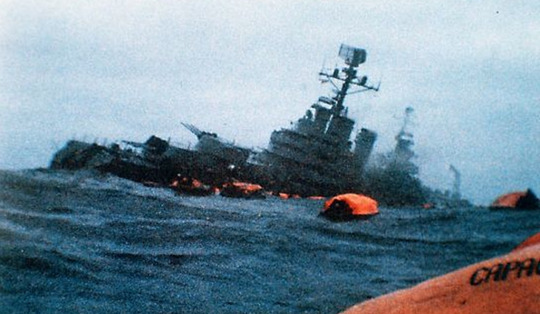
The sinking of the General Belgrano was arguably the most controversial episode of the Falklands War.
(Public domain via Wikimedia Commons)
Thatcher, sensing an opportunity to revitalize her faltering political aspirations, voiced her commitment to defending the Falklands in an April 5 interview with British broadcaster ITN: “We have to recover those islands, we have to recover them for the people on them are British … and they still owe allegiance to the crown and want to be British.”
The prime minister deployed a naval task force to the islands, upending the Argentinian military junta’s expectation that the British would acquiesce without mounting a defense. (Led by General Leopoldo Galtieri, the Argentinian dictatorship had embarked on the military campaign in hopes of appealing to nationalist sentiment and distracting the populace from Argentina’s poor economy.) Arriving in the Falklands in late April, British troops engaged in a series of naval and air battles, successfully wearing down Argentina’s superior air forces despite the U.S. Navy’s prediction that recapturing the islands would be a “military impossibility.”
According to the Telegraph, perhaps the “most controversial episode” of the conflict took place on May 2, when the Royal Navy’s Conqueror submarine sank the General Belgrano cruiser. Though the Argentinian vessel had entered Britain’s 200-mile exclusion zone the day prior, it had departed by the time of the torpedo attack and appeared to pose no immediate threat. At the same time, however, both sides acknowledged that the entire South Atlantic was essentially an operational theater of war; recent research also suggests that the vessel was directly involved in operations threatening the British task force. Approximately 323 Argentinian crewmen died in the sinking, making the incident the Falklands War’s single greatest loss of life.
Critics at the time accused Thatcher of ordering “the attack as a deliberate act of provocation designed to escalate the conflict and scupper hopes of a diplomatic resolution,” per the Telegraph. Public opinion remains divided, with proponents characterizing the sinking as a legitimate act of war and detractors condemning it as a war crime.
A 1994 report by the Argentinian Defense Ministry concluded that the attack was “a legal act of war.” Speaking with the Telegraph in 2007, Belgrano artilleryman Ruben Volpe said, “[T]his was a war and the attack was an act of war, not a war crime. Sinking our most potent vessel outside the exclusion zone demonstrated the power that the British had.”
On May 21, British commandos made an amphibious landing on the islands; after a few weeks of heavy fighting and further casualties, the Argentinians surrendered, bringing the 74-day clash to a close on June 14.
In total, 649 Argentinian military personnel, 255 British troops and 3 Falkland Islanders died over the course of the undeclared war. Though Britain celebrated its retention of control as an unmitigated triumph, this “glow of victory was to conceal how desperately close” the battle was, wrote columnist Simon Jenkins for the Guardian in 2013.
“The conclusion of most defense analysts is that the Argentinians should have won this war,” Jenkins added, “and had they [held out until] the south Atlantic storms of June they probably would have.”
How did the Falklands War shape modern British society?
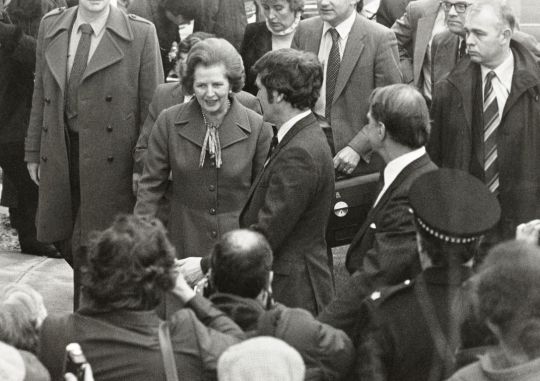
Margaret Thatcher’s response to the Falklands War secured her grasp on power and revitalized her faltering political career.
(University of Salford Press Office via Wikimedia Commons under CC BY 2.0)
Three days after Argentina invaded the Falklands, a survey of British citizens watching the events from home found that 88 percent of those polled felt the U.K. had an “obligation” to support the islanders. Seventy percent advocated sinking Argentinian ships if necessary, and 41 percent called for the immediate use of government force. In other words, the Falklands War was highly popular in an otherwise increasingly divided country.
“The empire was gone, the economy was struggling, the old industrial base was crumbling and the old certainties had vanished,” writes Sandbrook for History Extra. “Inflation, strikes, unemployment; riots, bombings, scandals; failure, shabbiness, disappointment: [T]his had been Britain’s narrative since the mid-1960s.”
Thatcher, who had run for office in 1979 on a platform of privatization of state-owned enterprises, decreased government spending and the restriction of trade unions, was finding it difficult to live up to her campaign slogan: “Don’t just hope for a better life. Vote for one.” Record-breaking unemployment and a recession the likes of which had not been seen since the Great Depression threatened to ensure her time as prime minister was short-lived. Then, Argentina invaded the Falklands, forcing the Conservative Party leader to quickly formulate a decisive response—a challenge she readily rose to meet.
Thatcher’s objectives were twofold, wrote historian Domenico Maria Bruni in a 2018 journal article: First, the prime minister had to defend her government against accusations of failing to prevent the attack. More importantly, she also needed to determine how best to defuse the potential military disaster.
“She was decisive, determined, effective,” Chris Collins, a historian at the Margaret Thatcher Foundation, told History.com in 2019. “There was never the slightest note of doubt in her public responses, and she was pretty clear privately too. We would get the islands back. I don’t think any other British leader at that time would have handled things quite as clearly.”
Sandbrook argues that the Falklands War supplied a dose of “nostalgic nationalism” to a country in need of a win.
“In practical terms it changed nothing,” he writes. “Psychologically, however, it changed everything. In the public imagination, it marked the end of an era defined by post-imperial introspection, providing a new national myth to rank alongside Dunkirk and the Battle of Britain.”
Following its humiliating defeat in the Falklands, Argentina’s military junta suffered a rapid fall from power, with citizens ousting the Peronist Justicialist Party in favor of a new regime. The result of 1983’s free election—the first of its kind in almost a decade—was widely heralded as “a vote for democracy,” according to the New York Times.
The Falklands, meanwhile, experienced an unprecedented period of post-war prosperity. As Larissa MacFarquhar writes for the New Yorker, Britain “allotted the islands more aid money than it ever had before,” in addition to granting islanders full British citizenship and offering independence “in all matters except foreign policy and defense.” In 2013, residents overwhelmingly opted to remain a British overseas territory, with just three of some 1,500 voters casting dissenting ballots.
How accurate is the series’ portrayal of the Falklands War?

Gillian Anderson as Prime Minister Margaret Thatcher (left) and Olivia Colman as Elizabeth II (right)
(Courtesy of Netflix)
The Netflix hit’s depiction of the war departs from historical accounts in several key areas. As the New York Times reports, “The Crown” paints Thatcher’s investment in the Falkland Islanders’ plight as a reflection of her anxiety over the fate of her son, Mark, who had gone missing in the Sahara while competing in an off-road race.
In actuality, Mark found himself stranded in the desert in January, a full two months before Argentinian workers raised their flag on the Falklands. Though the prime minister was understandably concerned about her wayward son, the crisis in no way affected her later response to the Falklands War. A rescue team—paid for, in part, out of Thatcher’s own pocket—located the 28-year-old six days after he was first reported missing.
“The Crown” shows a distraught Thatcher connecting the war to her personal woes by telling an aide, “Our people, far from home, their lives are in danger! Our own. We must do something.” But as Sandbrook tells History Extra, “There has never been even a hint that Margaret Thatcher was emotional or in any way distracted when dealing with the Falklands crisis. Any suggestion that she was is a complete invention.”
The historian describes the war as a high point in Thatcher’s divisive career. Nicknamed the “Iron Lady” for her “hard-driving and hardheaded” approach to governing, as the New York Times noted in her 2013 obituary, the normally abrasive prime minister was “a dream to work with” during the crisis, says Sandbrook. “This was partly because, as a woman, she wasn’t expected to have extensive military knowledge,” he explains, “so for once she didn’t feel the need to ‘show off’ or to dominate, she was quite happy to sit back and listen to the advice of her military men, whom she really liked.”
In “The Crown,” Thatcher strikes a balance between deferring to her advisors and taking charge, agreeing to an admiral’s plan of deploying British sailors immediately but dismissing another official’s prediction that “we will never survive an unnecessary and unaffordable war” with a sharp rebuke: “I say we will not survive not going to war.”
Though the Netflix series finds Thatcher’s royal counterpart, Elizabeth II, expressing disapproval of the Falklands War, her actual public comments on the matter suggest otherwise. In early June, just under a week before Argentina’s surrender, the queen welcomed U.S. President Ronald Reagan to the U.K. with a speech touting her government’s efforts to support “the cause of freedom.” She added, “The conflict in the Falkland Islands was thrust on us by naked aggression and we are naturally proud of the way our fighting men are serving their country.”
The prime minister, for her part, wrote in her unpublished memoir that she “went over to see the Queen at Windsor” upon receiving news of Britain’s victory.
Thatcher recalled, “It was wonderful to be able personally to give her the news that one of her islands had been restored to her.”
#History
1 note
·
View note
Text


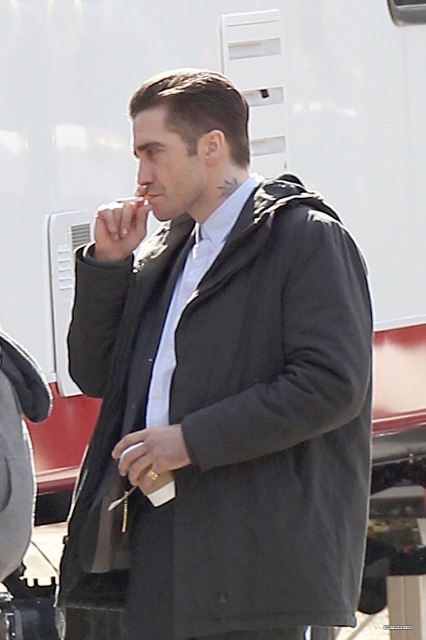






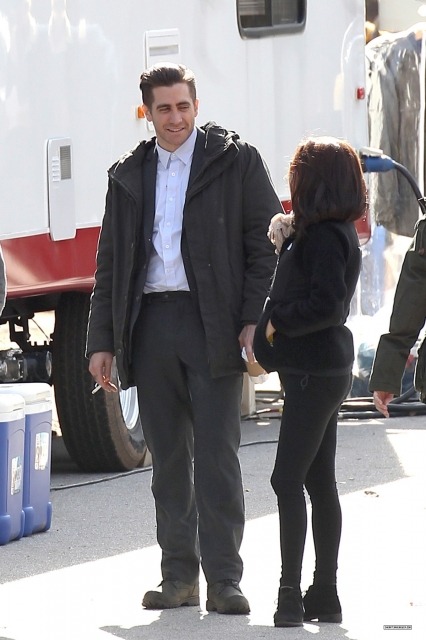





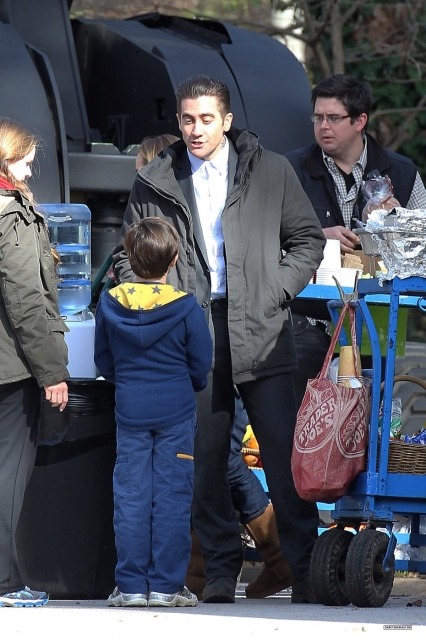

On The Set Of Prisoners In Georgia 2(2013) pics...
#On The Set Of Prisoners In Georgia 2(2013)#Donald mowat#makeup#makeup artist#jacob benjamin gyllenhaal#jake gyllenhaal#jacob gyllenhaal
7 notes
·
View notes
Text
Former MPD officer in court for felony charges of misconduct
Aden, who alludes to the law as a "survey charge," accentuates that allies of this bill know that "Individuals of color are excessively poor in this nation or have abundance abberations when contrasted with White individuals," and they're mindful that "individuals with lawful offense feelings have an extremely difficult time landing positions." Therefore, she says it's almost incomprehensible for some previous criminals to pay the entirety of their fines and expenses so as to cast a ballot jobs that hire felons.
Among January and March of 2019, over 44% of previously detained Floridians who enlisted to cast a ballot were Black, as indicated by the Brennan Center for Justice. The normal pay of these earlier detained inhabitants who enrolled to cast a ballot during this time was almost $15,000 underneath that of the normal citizen in Florida. In 2018, Florida's middle family salary remained at $55,462, as indicated by the Census Bureau.
Despite the fact that the fines and expenses related with a crime allegation fluctuate, it's assessed that a few criminals in Florida pay as much as $10,000 in fines. In certain states, similar to Alaska, fines for a lawful offense can be as much as $500,000. This expense is notwithstanding court and jury charges, with numerous states likewise including interest overcharges for criminals installment plans. In excess of 40 states, as indicated by The Atlantic, previous prisoners can be re-imprisoned on the off chance that they neglect to pay their charges.
Because of the death of the new Florida charge, the NAACP Legal Defense and Educational Fund, the American Civil Liberties Union, the ACLU of Florida and the Brennan Center for Justice recorded a claim in 2019 against the state, contending that the new law abuses the 24th Amendment, which restricts Congress or any state from forcing a "survey charge" on people who are qualified to cast a ballot.
On Friday, Sept. 11, 2020, six adjudicators from the eleventh U.S. Circuit Court of Appeals decided that the bill was not unlawful and that previous criminals in Florida will at present be legitimately expected to pay all fines and expenses before casting a ballot.
Electors line up to project their political race voting form at a Cobb County surveying station in Marietta, Georgia, October 13, 2020.
Elijah Nouvelage | Reuters
The historical backdrop of elector concealment and how it's being played out today
Florida's "survey charge" on previous criminals focuses to a bigger influx of new laws and approaches that target Black electors and different networks of shading, says Aden, who has affirmed before Congress about progressing demonstrations of citizen concealment.
"This is essential for our set of experiences, obviously," she says. "On the off chance that anybody comprehends our nation, it is established on this vision that solitary certain individuals ought to have a voice."
Before the thirteenth Amendment was passed in 1865, which nullified bondage and automatic subjugation, Black slaves were considered only three-fifths of an individual for tax assessment and portrayal purposes. After five years in 1870, Black men were conceded the option to cast a ballot when the fifteenth Amendment was sanctioned. Fifty years from that point forward, Black ladies were conceded the option to cast a ballot with the nineteenth amendment in 1920 creation it unlawful to disappoint somebody dependent on their sex. In any case, even with these laws set up, Black people were as yet hindered from casting a ballot because of Jim Crow laws that implemented befuddling proficiency tests and high survey charges on Black residents.
A long time later, on March 17, 1965, administrators presented the Voting Rights Act of 1965, which completely allowed Black individuals the option to cast a ballot. The demonstration came only 10 days after "Ridiculous Sunday" happened on March 7, 1965, where several individuals walked from Selma, Alabama to the state's capital of Montgomery to request casting a ballot rights for every single Black American, with a significant number of them being beaten and attacked by state troopers along the course.
The Voting Rights Act of 1965 is "one of the best bits of enactment in our set of experiences," says Aden, however the battle to maintain its securities proceed with today, particularly following the 2013 Shelby versus Holder Supreme Court choice.
"The Shelby choice immobilized the core of the Voting Rights Act, which we allude to as Section 5," she says. "This was the arrangement of the Voting Rights Act that said certain states and purviews, or locales inside them, needed to get pre-endorsed for each casting a ballot change before they could actualize it. Furthermore, every democratic change implies each surveying place change, any change to competitor capabilities, any change to qualification prerequisites, or whether you have to give an I.D."
The purpose of the law was to guarantee that minorities were not having their political force restricted, Aden clarifies. In 2006, Congress gathered a record enveloping in excess of 15,000 pages demonstrating that citizen concealment actually exists in numerous pieces of the nation.
Since the Shelby versus Holder choice in 2013, a few types of elector concealment have been on the ascent, including citizen cleanses — an imperfect cycle that should tidy up elector moves by erasing names from the elector enrollment arrangements of individuals who have kicked the bucket, moved or got ineligible to cast a ballot. In any case, in numerous states specialists accept that elector cleanses have frequently included erasing the names of qualified citizens.
1 note
·
View note
Text


My Legal Battle with my Family and their Co-horts / Co-conspirators (147):
Something I want to point out and then I'll get back to the proof of my family intentionally causing me seizures - The attached image is of a character letter written by an inmate named Kenneth C. Smith with whom I was incarcerated from 2008 - 2012 at Wilcox State Prison. He wrote this letter on January 1st, 2011 as part of a written presentation that was made to the Georgia State Board of Pardons and Paroles on my behalf for their review when deciding on whether or not to grant me parole.
If you notice at the top of the second page Kenny states,
"The Sumter's are a very rare breed of human kind. I've come to know his mother, and father, whom are great people...."
I post this as further solidification of the relationship my family developed with this inmate, whom they employed to physically assault me twice while incarcerated and then once I was released to come to my Atlantic Station apartment and threaten me with a knife. This man threatened me with a knife and told me I had to move out of Atlanta. My family was trying to run me out of town so I couldn't press charges or sue them for their crimes and torts.
I will also add to this post sworn statements from my mother, Gloria Sumter, and father, Leonard Sumter Jr., how my mother corresponded with this man while I was incarcerated and their attempts to downplay their relationship. After this man began harrassing and threatening me at my Atlantic Station apartment, I was forced to file a TPO (Temporary Protective Order) against him. I will also attach a copy of this TPO to this post. This was also stated in the lawsuit I filed on March 9th, 2015 against my family in the Fulton County Superior Court and for which my parents, Leonard and Gloria Sumter, defaulted. Defaulted means they waived their right to defend themselves against any of the pleadings and that I won exactly what I sued them for ($1,500,000) by default. Of course, they only defaulted because they believed I would commit suicide and be dead and therefore they wouldn't have to ever answer for any of their crimes or torts.

This is a screenshot of the 4th set of Continuing Interrogatories I sent my parents as part of a federal diversity jurisdiction lawsuit I filed against them in 2016. Theses were answered under oath on 11-21-16. Here my parents admit to informing me via text message on three (3) different occasions between January 2014 and January 2015 that Kenneth C. Smith had been arrested. While they did admit to knowing this and to texting me this information, they purport here that they learned of his arrest by doing "research on the internet." I'm sure this was a cover because they were in constant contact with this man, whom they hired to physically assault me on two (2) different occasions while in prison (both times he broke my nose), and whom they hired to threaten me with a knife when I was living in Atlanta at Atlantic Station from February 2013 - February 2015. When he threatened me with the knife at Atlantic Station, he threatened my life and stated I had to move out of Atlanta. This threat was issued to prevent me from being able to sue or prosecute my parents and their co-horts for the crimes and torts they committed against me, and still to this day, continue to commit against me.

This is a screenshot of the 3rd set of Continuing Interrogatories I sent my parents as part of a federal diversity jurisdiction lawsuit I filed against them in 2016. These were answered under oath on 10-11-16. Here my mother, Gloria Sumter, admits to corresponding with inmate Kenneth C. Smith from 2008 to 2013. She purports that this was "at [my] request" as she attempts to veil her nefarious conduct.

This is a screenshot of the 3rd set of Continuing Interrogatories I sent my parents as part of a federal diversity jurisdiction lawsuit I filed against them in 2016. These were answered under oath on 10-11-16. Here my mother, Gloria Sumter, admits to having knowledge of inmate Kenneth C. Smith physically assaulting me in 2011 while in prison. Although, she did know of him also assaulting me in 2009 while in prison, she attempts to downplay her knowledge and involvement in these brutal physical attacks by purporting to only know of the one that occurred in 2011.

This is a screenshot of the 3rd set of Continuing Interrogatories I sent my parents as part of a federal diversity jurisdiction lawsuit I filed against them in 2016. These were answered under oath on 10-11-16. Here my mother, Gloria Sumter, admits that (after I was released from prison and living at Atlantic Station) she received a letter from inmate Kenneth C. Smith and forwarded it to me. Obviously, if I had wanted this dangerous violent felon to have my address, I would have provided him with it. Without even asking me, she "forwarded" this mail to me, and I'm sure this is also when she provided him with my address in Atlanta where I was living. I mean, why WOULD you forward a letter from an armed robber that physically assaulted your son on two occassions, breaking his nose both times, to your son. And without even asking him?
0 notes
Text
Events 10.13
54 – Roman emperor Claudius dies from poisoning under mysterious circumstances. He is succeeded by his adoptive son Nero, rather than by Britannicus, his son with Messalina.
409 – Vandals and Alans cross the Pyrenees and appear in Hispania.
1269 – The present church building at Westminster Abbey is consecrated.
1307 – Hundreds of the Knights Templar in France are arrested at dawn by King Philip the Fair, and later confess under torture to heresy.
1332 – Rinchinbal Khan becomes the Khagan of the Mongols and Emperor of the Yuan dynasty, reigning for only 53 days.
1399 – Coronation of Henry IV of England at Westminster Abbey.
1644 – A Swedish–Dutch fleet defeats the Danish fleet at Fehmarn and captures about 1,000 prisoners.
1710 – Port Royal, the capital of French Acadia, falls in a siege by British forces.
1775 – The Continental Congress establishes the Continental Navy (predecessor of the United States Navy).
1792 – In Washington, D.C., the cornerstone of the United States Executive Mansion (known as the White House since 1818) is laid.
1793 – French Revolutionary Wars: Austro-Prussian victory over Republican France at the First Battle of Wissembourg.
1812 – War of 1812: Sir Isaac Brock's British and native forces repel an invasion of Canada by General Rensselaer's United States forces.
1821 – The Declaration of Independence of the Mexican Empire is publicly proclaimed.
1843 – In New York City, B'nai B'rith, the oldest Jewish service organization in the world, is founded.
1881 – First known conversation in modern Hebrew by Eliezer Ben-Yehuda and friends.
1885 – The Georgia Institute of Technology is founded in Atlanta, Georgia.
1892 – Edward Emerson Barnard is first to discover a comet by photographic means.
1903 – The Boston Red Sox win the first modern World Series, defeating the Pittsburgh Pirates in the eighth game.
1908 – Margaret Travers Symons bursts into the UK parliament and becomes the first woman to speak there.
1911 – Prince Arthur, Duke of Connaught and Strathearn, becomes the first Governor General of Canada of royal descent.
1915 – First World War: The Battle of the Hohenzollern Redoubt marks the end of the Battle of Loos.
1917 – The "Miracle of the Sun" is witnessed by an estimated 70,000 people in the Cova da Iria in Portugal.
1921 – Soviet republics sign the Treaty of Kars to formalize the borders between Turkey and the South Caucasus states.
1923 – Ankara becomes the capital of Turkey.
1943 – World War II: Marshal Pietro Badoglio announces that Italy has officially declared war on Germany.
1944 – World War II: The Soviet Riga Offensive captures the city.
1946 – France adopts the constitution of the Fourth Republic.
1962 – The Pacific Northwest experiences a cyclone the equal of a Category 3 hurricane, with winds above 150 mph. Forty-six people die.
1972 – Aeroflot Flight 217 crashes outside Moscow, killing 174.
1972 – Uruguayan Air Force Flight 571 crashes in the Andes mountains. Twenty-eight survive the crash. All but 16 succumb before rescue on December 23.
1976 – The first electron micrograph of an Ebola virus is taken at the Centers for Disease Control and Prevention by Dr. F. A. Murphy.
1977 – Hijacking of Lufthansa Flight 181 by the Popular Front for the Liberation of Palestine.
1983 – Ameritech Mobile Communications launches the first US cellular network in Chicago.
1990 – Syrian forces attack free areas of Lebanon, removing General Michel Aoun from the presidential palace.
1993 – At least 60 people die in eastern Papua New Guinea when a series of earthquakes rock the Finisterre Range, triggering massive landslides.
2010 – The mining accident in Copiapó, Chile ends as all 33 trapped miners arrive at the surface after a record 69 days underground.
2013 – A stampede occurs in India during the Hindu festival Navratri, killing 115 and injuring more than 110.
2016 – The Maldives announces its decision to withdraw from the Commonwealth of Nations.
2019 – Kenyan Brigid Kosgei sets a new world record for a woman runner with a time of 2:14:04 at the 2019 Chicago Marathon.
0 notes
Text
Black Lives Matter
Hi, nice to meet you!
My name is Ayumi Konno, and I am the founder of Bibelot, an online shop selling apparel, picture books and miscellaneous goods. I am also the mother of a 10 month old baby.
After hearing about the death of Mr. George Floyd, I started to learn more about racial discrimination against black people in the United States and began to wonder what I personally could do to fight against racism. I decided to collaborate with artists to create T-shirts that will spark discussions and bring awareness to this issue.
History and current status of discrimination against black people in America
In America, black people have suffered discrimination for a very long time, and this racist oppression continues today.
Forced into slavery in the 17th century in America, black people continued to experience racism even after slavery was abolished in 1865.
After that, Jim Crow laws did not recognize black people as having the same rights as white people, and separated black people from white people in public institutions (schools, buses, toilets, etc.).

Image reference: zinnedproject.org
In America’s history, there are many instances of black people being murdered. As a new parent, learning about the following injustice of the murder of Mary Turner in particular left an impact on me.
The murder of Mary Turner, who lived in Georgia in 1918.
On May 18, 1918, a man named Hayes Turner was murdered by a mob of white people after a white landowner was killed.
His wife Mary Turner denounced the mob who killed her husband and in response was murdered brutally by the mob. Despite being 8 months pregnant, she was lynched, her body strung up on a tree, set on fire, and her unborn child murdered.
In 1865, Article 13 of the US Constitution was passed, abolishing slavery. However, violent racism persisted and mob lynchings and burning of black people’s houses by the KKK (white supremacist organization) was rampant.
The Jim Crow laws that enforced racial segregation continued until the Civil Rights Law was enacted 56 years ago.
Discrimination is not a thing of the past, it continues today.
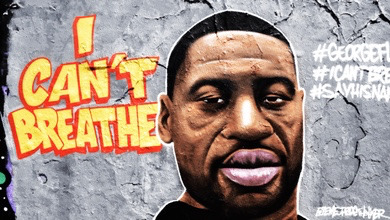
Image reference: humanevents.com
Today, many black people in America live with the fear of being arrested for no reason and beaten by the police, even in the midst of their daily activities whether it’s going out to take a walk, or even sleeping at home.
Article 13 of the Constitution abolishes slavery, but does not apply to those sentenced to prison.
Even innocent people or those who have been arrested for misdemeanors and who cannot afford bail are sentenced to work jobs receiving hourly wage of the equivalent of 15 to 150 yen, not eligible for social security benefits.
Percentage of population living in poverty (2018): 8.1% white, 20.8% black
Wealth disparity (2017): Median wealth of white households is 10 times that of black households
According to the statistical results from 2013 to 2019, although 76.3% of the American population is white and 13.4% is black, black people are three times more likely than white people to be killed by police. Of those killed by police, black people were 1.3 times more likely to be unarmed than white people.
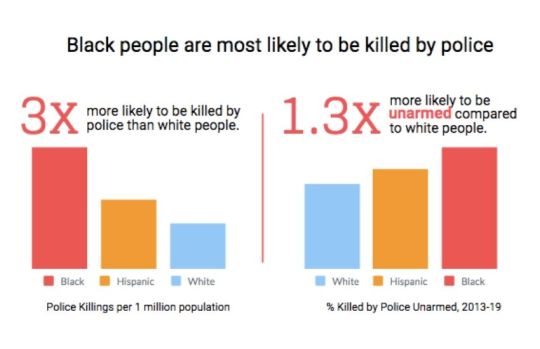
Reference Reference: Mapping Police Violence|Mapping Police Violence
And systematic racism afflicts black people today.
Please see this video for a summary of this project and institutional discrimination in below.
Discrimination in Japan
Many people may think that this has nothing to do with Japan and that racism against black people does not even exist in Japan.
However, it has become clear that across generations in Japan, stereotypes and prejudices against black people exist.
It’s theorized that in the wake of the second world war, one of the ways that Japan sought to bolster its reputation amongst Western countries was adopting America’s racist attitudes towards black people. In essence, they joined white America in viewing black people as the common enemy.
To this day, that affects how black people are portrayed in Japanese media, which all too often is via racist stereotypes and caricatures.
Why I decided to start this project
The murder of Mr. George Floyd on May 25th by a white police officer was the incident that moved me to do something.
After learning about George Floyd’s murder, I contacted a black friend, watched the video of the incident and read to try to understand what had happened and why.
Ashamed that I did not know about the suffering so many people experience at the hands of systematic racism today, I thought that I could do something and started planning this project.
If I want to help my black friend, I understood that I have to be part of systemic change.
I felt that systemic change requires the power of many, not just of a minority, not just of those in the United States, but many people all over the world, including Japan.
What I want to achieve with this project
For racism to be abolished and for our world to be one where no child or adult experiences discrimination or discriminates against anyone in any country.
With that in mind, I want to start by understanding and learning, and talking with others more.
So, I made a T-shirt with two artists to help start the conversation.
My hope is that through this project, through these Tshirts and artworks, people can discuss, share and learn.
Massage from Friend
I am so encouraged. Friends around the world are rising up. My friend Ayumi said when she started learning about systemic racism she was ashamed she didn’t know before. But by googling, watching movies, reading books, talking to friends, she is an example that we can always learn. It is never too late to learn. I am grateful, too, that she has so eagerly joined in doing the work, and sharing what she’s learning with others in her community esp those who are mostly Japanese-speaking.We shall over come!
Use of funds
T-shirt production cost: JPY 1500-2000 depending on the number of orders received
Transportation costs and tariffs from the UK: Approximately 20,000 yen
Return shipping cost: Approximately 20,000 yen (when 100 pieces are shipped by mail)
Kenzo's design fee: 25,000 yen (500 yen x 50 pieces)
All other proceeds will go to the Black Lives Matter movement.
Schedule of delivery
September 1 Preorder begins
September 30 Preorder finishes
October 1 Final order of T-shirts
Estimated shipping from Bar One Clothing in England in late October
As soon as Tshirts arrive, they will be shipped out in November
Donation made to the BLM movement after completing shipping of Tshirts in late November
We will announce the specific BLM organizations and report the total donation amount on this note, Bibelot's instagram account, and YouTube Hug Fuku Channel.
I will be placing the final order on October 1st, so please complete payment by then. Please transfer money to PayPal.
Collaboration T-shirt with Kenzo
¥3500


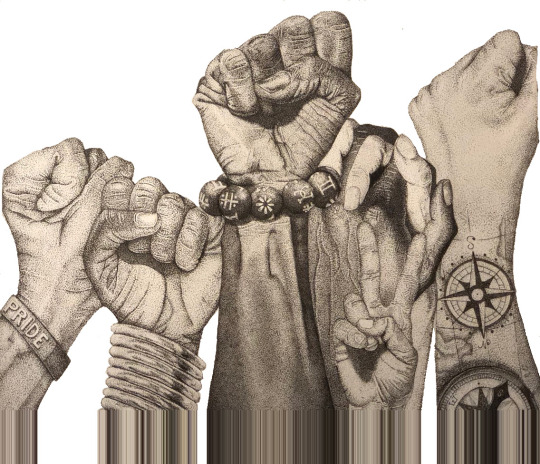
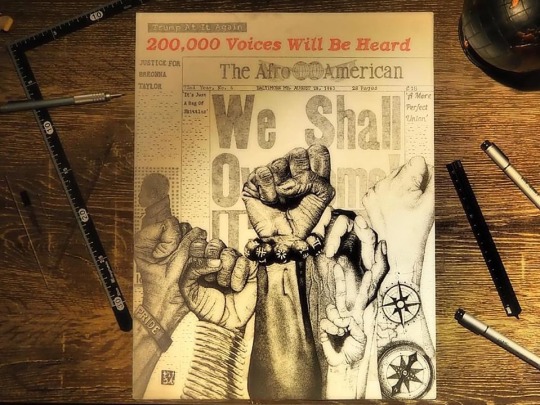
Collaboration T-shirt with artist Kenzo
After George Floyd's murder, I contacted my black friends, and was introduced to Kenzo, a black artist living in Ogasawara. A pointillist artist, Kenzo’s artwork is amazingly painstaking.
Only the stippled area is printed on the silk screen. Both men's and women's Tshirts will be printed on organic cotton Tshirts called Earth Positive, which are produced using only renewable energy. The material is very soft to the touch and comfortable to wear.
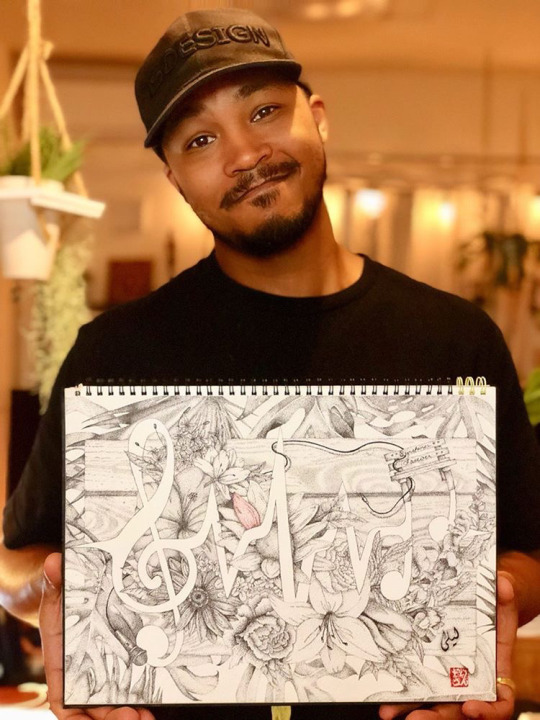
From KENZO
This picture holds a lot of meaning for. I have never thought so much about a single drawing. It stirs up a lot of emotions in me.
The importance of black life does not mean that black life is more important than anyone. A symbol of unity, and solidarity. It’s about standing up for someone who is suffering. The person who cried "I CANT BREATHE". A person who is treated like an animal rather than a human.
This is not just an American problem. It affects the whole world.
Can you imagine a world in which you are afraid of the people who are supposed to support and protect you?
Even when they are victims and should be the ones receiving protection, they must fear their own lives from those who are supposed to protect them.
This is the world in which we, people of color, have to live.
But there is hope. People all over the world are standing up with us. With Black Lives Matter they are standing up for the right thing!
This drawing is meant to shed light on those who fought for us and keep fighting with us! It has a little history and represents what I think #blacklivesmatter represents.
With this, I hope you share it with your friends and help them get out of it. It takes a total of 139 hours to complete and is made entirely of dots. With each dot I thought of all the people of color who are suffering from oppression.
Collaboration T-shirt with NAO HIGA
¥3500
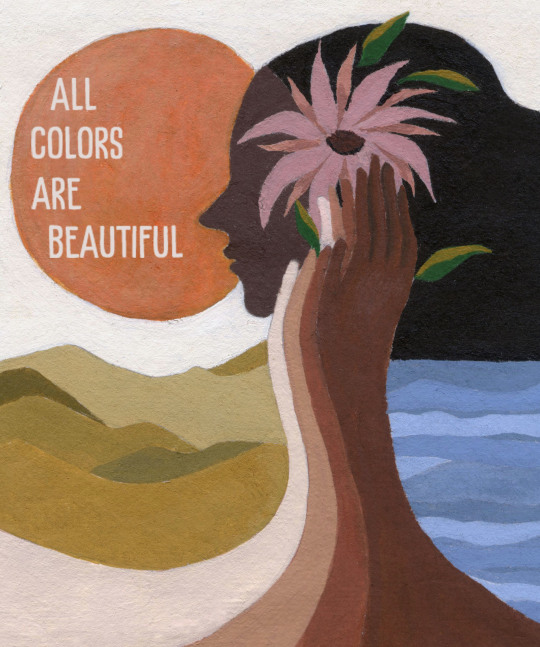

I asked HIGA NAO (Bonmu) to design the women's T-shirt.
NAO-san wanted to donate her work in support of the movement.
Nao's paintings depict brown-skinned women. For Nao, brown is the color of nature and is very beautiful.
NAO HIGA (Bonmu)
Born in Miyagi
After 10 years as a graphic designer and illustrator in Tokyo, she moved to Kumejima, Okinawa, and expresses the inspiration that she received from the natural scenery and life of the island through silkscreen.
She shares, “Currently, I am engaged in daily production activities in Yanbaru, where the rich nature of the main island of Okinawa remains.”
✴︎ NAO's thoughts on the project ✴︎
“While I have lived so far, I have witnessed scenes of discrimination, of varying severity, in various places.
My world started to move little by little as a result of these incidents.
I think the world will definitely change if each one of us can pay attention to what is happening.
And I want to leave a peaceful and bright future without discrimination for future children! With these feelings, I resonated with the aim of the project and so I wanted to participate.”
How to preorder Tshirts
If you would like support this project and reserve a Tshirt, please e-mail [email protected] (Please be sure to add this address to your contacts so that you can receive emails) If you do not receive a reply within 3 days, please check the settings again and resend.
To make your reservation, copy and past the following text:
① Kenzo or Nao Higa (Only write the designer whose Tshirt you would like)
②Size (Please choose from MEN’S: Small, Medium, Large or WOMEN’s: Small, Medium, Large)
③ Color (white or black)
④ Your name
⑤ Address
⑥ Phone number
⑦ Message of support for this project (optional)
(Please note that we may anonymously share your message on SNS.)
I will be placing the final order on October 1, so please complete payment by then. Please transfer money to the following account; Paypal
If you have any questions, please feel free to contact us.
Finally
I grew up in Japan and still live in Japan. I just quit the company and started a shop, so I can't afford it. But I thought there was something I could do for this problem. Nowadays, there are many people who do not have black friends around them, so many of them may not be able to catch themselves.
I think this is a story that is relevant to you when you think about the future, not the fire on the opposite bank.
During the internationalization, my child may marry a black man and his grandson may have dark skin.
I want my children and grandchildren to be rewarded for their efforts to avoid discrimination when they go abroad.
There are many social problems, but let's start from what we can do.
And many black people are still being treated badly and unable to get out of a difficult environment.
Analyze how you feel, investigate, talk to people, share on SNS, make donations, buy.
I think there is some courage in what you think of. I want you to be brave and take a step forward.
Many people have cooperated since the end of May. I've been working for this project, and I'm really happy to hear that I'm in agreement.
We hope that you can participate in the change in the world by empathizing and supporting us.
Self-introduction
Ayumi Konno
Born in 1991
Born in Hitoyoshi City, Kumamoto Prefecture Up to 6 years old Shizuoka City, Shizuoka Prefecture 6 to 18 years old Raised in Omihachiman City, Shiga Prefecture
I have a childhood friend with the blood of Brazil and Japan, and I want to talk to people from various countries who have an interest in multiculturalism by studying abroad in China in the first year of high school and have an interest in multiculturalism.
Going to Toronto alone at the age of 19 to study the dream of wanting to be a used clothing store
Worked for a secondhand clothing wholesale company in Toronto, but after being shocked by a discriminator, he left the company.
After returning to Japan, I want to go to a place with nature
Worked at a hotel on Iriomote Island in Okinawa, or settled in the mountain of Hakuba in Nagano
Volunteer in 2012 to visit Miyagi prefecture and meet her current husband and marry in 2014
Worked at an apparel company since 2013 and experienced recruitment with a store manager and personnel department.
I was planning to return to work after giving birth and taking childcare leave in 2019,
Decided to retire in 2020 and set up my own store in May
We are struggling to communicate social and environmental issues through clothes and books so that we can become aware of them
undefined
youtube
1 note
·
View note
Photo


Two-time Olympic judo champion Peter Seisenbacher of Austria has denied the alleged sexual assault of two young girls he was coaching in the early 2000s. According to state prosecutors, the alleged abuse took place in Vienna between 1999 and 2004.
VIENNA (AP) – Two-time Olympic judo champion Peter Seisenbacher of Austria has denied the alleged sexual assault of two young girls he was coaching in the early 2000s.
At the start of his trial on Monday, Seisenbacher said: ’‘I am not guilty.”
According to state prosecutors, the alleged abuse took place in Vienna between 1999 and 2004. The women filed charges against their former coach in 2013.
“Nothing has happened. Nobody has been attacked,” Seisenbacher’s attorney, Bernhard Lehofer, said.
Seisenbacher is alleged to have sexually assaulted one of the girls in 1999, when she was 11, and then abused her on multiple occasions until 2002. Also, he allegedly sexually assaulted a 13-year-old girl in 2004.
He has also been charged with the attempted assault of a 16-year-old pupil while at a training camp in Croatia in 2001.
If found guilty, the 59-year-old Seisenbacher could face a prison term of up to 10 years.
Initially the trial in a Vienna regional criminal court was set to begin nearly three years ago, but the case was adjourned in December 2016 after Seisenbacher failed to show up in court.
His whereabouts were unknown for months before he was arrested in Kyiv in August 2017 but released from detention before Ukrainian authorities decided on an extradition request from Austria.
He was again arrested when he tried to cross the Ukrainian-Polish border with a fake passport three months ago.
In 1988 in Seoul, South Korea, Seisenbacher became the first judoka to win gold at two consecutive Olympics, having also won in 1984 in Los Angeles.
As a coach, he helped Georgia’s Lasha Shavdatuashvili win gold in the men’s 66-kilogram division at the 2012 London Olympics, and led the Azerbaijan team to two silver medals at the Rio de Janeiro Games four years later.
1 note
·
View note